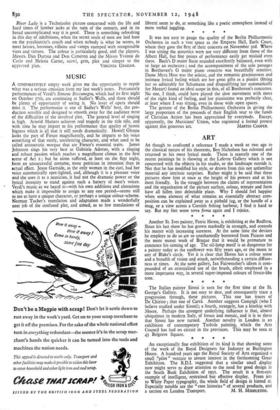MUSIC
A COMPARATIVELY empty week gives me the opportunity to repair what was a serious omission from my last week's notes. Fortunately performances of Verdi's Simone Boccanegra, which had its first night on October 27th, are continuing at Sadler's Wells, and there should be plenty of opportunity of seeing it. No lover of opera should miss it. The performance is one of Sadler's Wells' best, the pro- duction sensible and designed to smooth away for the audience most of the difficulties of the involved plot. The general level of singing is high. Arnold Matters achieves real tragedy in the title role, and with time he may impart to his performance that quality of heroic bigness which is all that it still needs dramatically. Howell Glynne looks the part of Fiesco magnificently, and he imparts to his voice something of that steely, unrelenting character, and what used to be called aristocratic morgue that are Fiesco's essential traits. James Johnston sings his very best as Gabriele Adorno, with a ringing and robust passion which reaches a magnificent climax in the first scene of Act 2 ; but he alone suffered, at least on the first night, from an unsuccessful costume, more patrician in intention than in actual effect. Joyce Gartside, as the only woman in the cast, had her voice automatically spot-lighted, and, although it is a pleasant voice and she uses it as a musician, it had not the dramatic power or the lyrical intensity to stand against such a battery of men's voices. Verdi's music as we heard it—with his own additions and alterations which make it impossible to assign to any one period—seems still to me to have a unique character, or perhaps a unique colour-scheme. Norman Tucker's translation and adaptation made a wonderfully neat job of the confused plot, and aimed, as so few translations of libretti seem to do, at something like a poetic. atmosphere instead of mere verbal juggling. *
It was not easy to gauge the quality of the Berlin Philharmonic Orchestra in such a vast space as the Empress Hall, Earls Court, where they gave the first of their concerts on November 3rd. Where I was sitting the acoustics were not very different from those of the Albert Hall, but fine points of performance easily get mislaid even there. Bach's D major Suite sounded excellently balanced, even with so large an orchestra ; and the accompaniment of the solo passages in Beethoven's G major piano concerto was beautifully sensitive. Dame Myra Hess was the soloist, and the romantic graciousness and intimate lyrical feeling which are her great gifts as a pianist (fitting her so admirably for Schumann and disqualifying her automatically for Mozart) found an ideal scope in this, of all Beethoven's concertos. No one, I think, could have played the slow movement with more of the right kind of feeling, and her pianissimo was perfectly clear, at least where I was sitting, even in those wide open spaces.
The gesture of the Berlin Philharmonic Orchestra in giving the large proportion of the proceeds of their English tour to the funds of Christian Action has been appreciated by everybody. Except, apparently, the Musicians' Union, who registered a formal protest


































 Previous page
Previous page